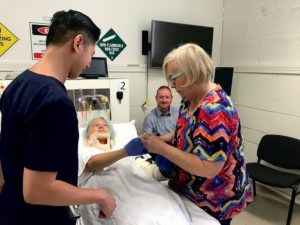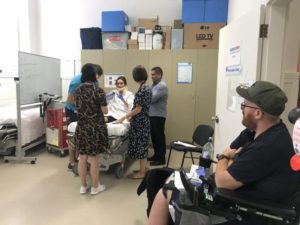The POWH Spinal SIM team consists of:
– Dimity Cooper (POWH SIU SW)
– Luke Chmielewski (POWH SIU OT)
– Jenni Graves (POWH SW)
– Andrew Murray (POWH CNC)
The Spinal SIM project team would like to acknowledge the support of the following:
– Tracy Levett-Jones (Professor of Nursing Education & Interim Head of School)
– Jacqui Pich (Senior Lecturer UTS)
– Samantha Jakimowicz (Lecturer UTS)
– Dan Holt (Peer Support Manager, Spinal Cord Injuries Australia)
– Diane Brown (Consumer Rep)
It is common for people with SCI to experience loss of identity, autonomy and self-confidence, while also transitioning through phases of denial, anger and grief (AIWH 2020). These emotions are often encountered during the rehabilitation admission. It is therefore likely that a person with SCI will experience a heightened sense of unfamiliarity while in this setting, as well as feelings of vulnerability, distress and being a burden to staff, carers and family.
The Prince of Wales Hospital (POWH) Spinal Injuries Unit (SIU) team has partnered with the University of Technology, Sydney (UTS) to create a spinal simulation (SIM) learning programme. The programme has been developed in collaboration with both consumers and carers. “This project aims to improve compassionate care that we provide to our patients in the SIU”
The Spinal SIM is structured to gauge participants’ baseline measures of their empathy and compassion. Following the baseline survey, the Spinal SIM will enable the participants to experience the perspective of a spinal injury from either the perspective of a patient, or as a supporting family member. During the simulation experience, participants will experience a good occasion of service provision, contrasted by a less positive example of care.
Following the Spinal SIM, participants will attend a debrief exercise which is supported by a trained facilitator to reflect on their experiences and observations during the simulation. Once this debrief has occurred, participants will complete a post-SIM survey.
It is hoped that participants will achieve the following outcomes:
· Discuss the potential emotions and needs of people with quadriplegia.
· Identify the physical and psychosocial needs of a person with a spinal injury.
· Identify appropriate person-centred and empathetic care to address the needs of a person with a spinal injury who is undergoing rehabilitation.
· Discuss the potential emotions and needs of people whose family member/significant other has tetraplegia resulting from a spinal injury.
· Reflect on how one’s personal and professional experiences, perspectives, attitudes and biases might influence the care provided to people with a spinal injury.
· Reflect on how empathic healthcare interactions can influence the health and wellbeing of people with a spinal injury.
· Discuss how completing this simulation might influence the care provided to people with a spinal injury and their family.




